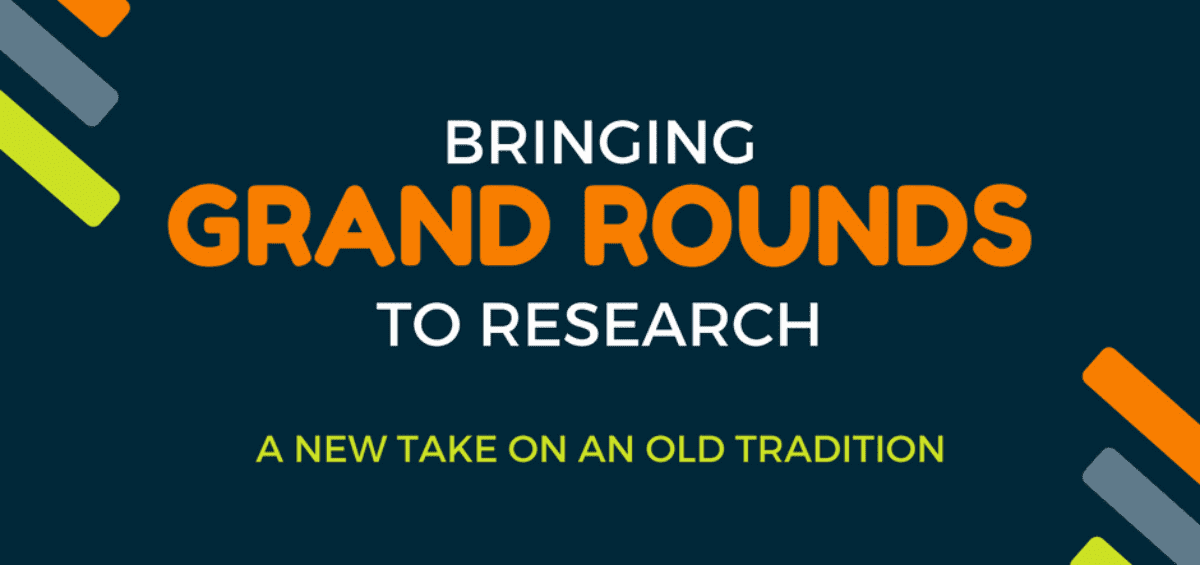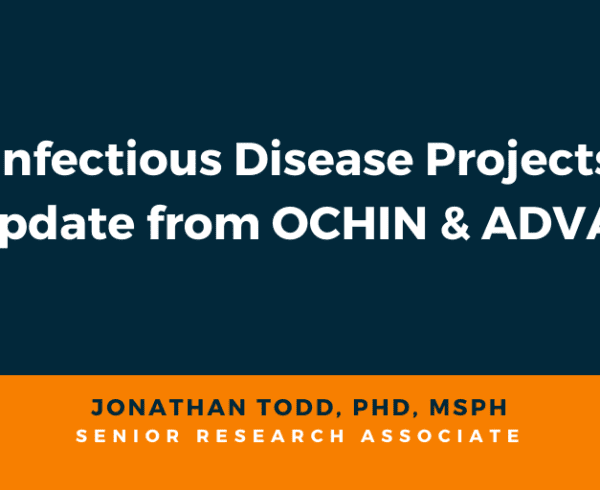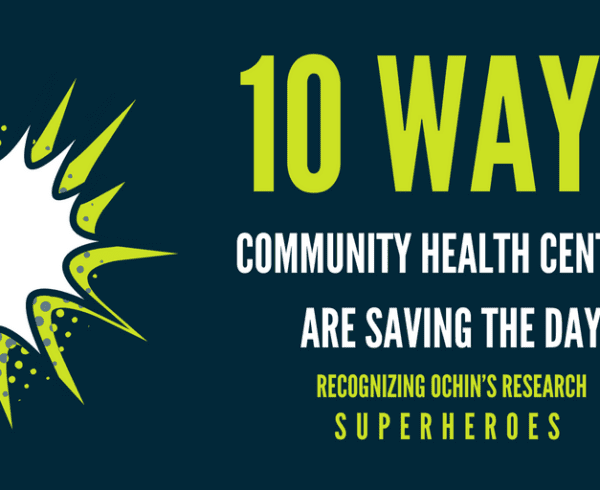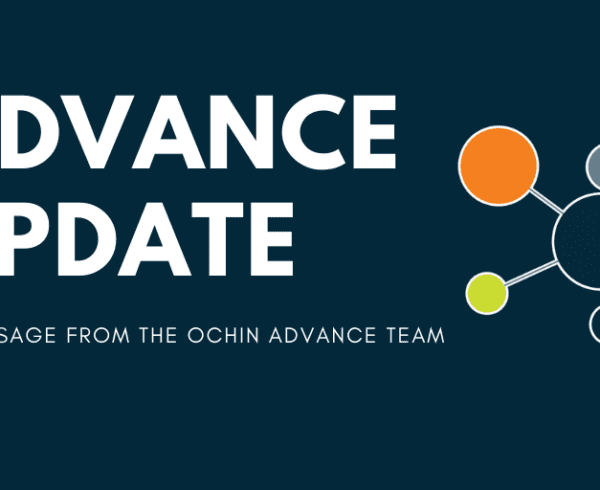ADVANCE meets its goals around engagement and dissemination via coordinated efforts from the ADVANCE Data Coordinating Center OCHIN, Inc. One method for dissemination is the OCHIN Grand Rounds series, which kicked off its second season this past November with Dr. Erika Cottrell presenting Adoption of EHR Tools for Collecting and Acting on Social Determinants of Health in Primary Care Community Health Centers. ADVANCE recently sat down with OCHIN’s Dissemination Team to learn more about Grand Rounds and what to expect in 2018.
—
What are OCHIN Grand Rounds?
OCHIN Grand Rounds offer an opportunity for researchers to present their work to an audience of clinicians, researchers, clinic staff, stakeholders, patient investigators, and members of the general public. These presentations are hosted online, and include a 45 minute talk from the presenter followed by a 15 minute Q&A session.
How do OCHIN Grand Rounds differ from traditional Grand Rounds?
In medicine, Grand Rounds are an essential teaching tool that allows medical professionals to present case studies, medical problems, and treatment best practices to an audience of doctors, residents, and medical students as a way to inform and improve patient care. OCHIN Grand Rounds differ in a few key ways. First, while traditional Grand Rounds are typically closed events, the OCHIN Grand Rounds series is open to the public. Anyone interested in attending a session is welcome to register, and even ask questions of the presenter. OCHIN Grand Rounds also differ from the traditional practice in that they utilize technology to enhance accessibility and allow for remote attendance. Finally, OCHIN Grand Rounds content is intended to be appropriate for a wide audience including researchers, patients, clinicians, students, and the general public. As such, these presentations are focused around our research priority areas and include learnings relevant to community health centers and safety net clinics.
Why are Grand Rounds important to ADVANCE?
As we mentioned, ADVANCE has many engagement and dissemination goals. As a PCORnet CDRN, ADVANCE strives to build public trust in research by employing robust and novel engagement and dissemination strategies. Grand Rounds make up just one aspect of this larger strategy. The participatory nature of the series affords greater transparency and accessibility as audience members are able to ask presenters their questions directly and in real time. Grand Rounds offers a unique opportunity for all stakeholders to connect to the research community and it is an important tool for ADVANCE engagement and dissemination.
What has been presented at Grand Rounds in the past?
- Adoption of EHR Tools for Collecting and Acting on Social Determinants of Health in Primary Care Community Health Centers by Erika Cottrell, PhD
- Feeling Disconnected? Computers, Communication, and Clinician Well-Being in the Safety Net by Neda R. Ratanawongsa, MD
- Use of Electronic Health Records (EHRs) and Personal Health Records (PHRs) for Population Research and Patient Engagement by Julie Bower, PhD, MPH
- Addressing the Social Determinants of Health Through Clinic-Based Community Organizing by Luis Manriquez, MD and Brian Park, MD, MPH
- Measuring an Epidemic: Using EHR Data to Track Trends in Opioid Prescribing by John Muench, MD, MPH and Thuy Le, MPH
 What can I expect at the next Grand Rounds event?
What can I expect at the next Grand Rounds event?
Our next Grand Rounds is scheduled for Friday, January 12 from 12-1PM PT. Dr. Melinda Davis is presenting, Finding the Right FIT: A Community-led Study of Rural Patient Preferences for Fecal Immunochemical Test (FIT) Characteristics.
Colorectal cancer (CRC) is the third leading cause of cancer death in the United States, yet one in three Americans have never been screened for colorectal cancer. Annual screening using fecal immunochemical tests (FIT) is often a preferred modality in populations experiencing CRC screening disparities. While multiple studies evaluate the clinical effectiveness of FITs (e.g., sensitivity, specificity), few studies assess patient preferences toward kit characteristics (e.g., collection method, sample requirements). Therefore, we undertook this study to assess patient preferences for 6 FITs used by primary care clinics within one rural Medicaid Accountable Care Organization (ACO). Findings can be used by clinicians, payers, and health system leaders to help select FITs that are both clinical effective and display patient preferred test characteristics.
Melinda Davis, PhD, is Associate Professor in the Department of Family Medicine and OHSU-PSU School of Public Health and the Director of Community Engaged Research for the Oregon Rural Practice-based Research Network (ORPRN). Dr. Davis, who was raised in the Columbia River Gorge, currently co-leads the Community Health Advocacy and Research Alliance (CHARA), a community-academic partnership with a mission to “identify, develop, and conduct health research to answer questions that matter in the Gorge.” Dr. Davis is a participatory implementation scientist and is currently a National Cancer Institute-funded K07 scholar. She has over 10 years of experience working with patient, community and health system partners to identify and address health disparities in rural and underserved settings, including working for four years as a practice facilitator for ORPRN. Dr. Davis is currently conducting mixed methods research to understand regional variation in colorectal cancer screening and to partner with patients, practices, and health system stakeholders to implement evidence-based intervention to improve colorectal cancer screening and treatment.
Why is this topic important to ADVANCE stakeholders?
Selecting FITs that are both clinically effective and display characteristics preferred by patients may improve test completion rates and ultimately lead to reductions in colorectal cancer. This presentation will also highlight methods used to build the academic-community collaborative that conducted this research. Findings may provide insight into strategies to increase colorectal cancer screening through FIT selection, as well as to foster collaborative academic-community based research partnerships.
How do I attend?
To attend our January Grand Rounds, please register here. This is an online event, and registration will remain open until 5 minutes prior to the event.
If I want to present my research at OCHIN Grand Rounds, or nominate someone to present, who should I contact?
If you are interested in presenting your research at an upcoming Grand Rounds session, please contact OCHIN Research Coordinator, William Jacob Amadeus Pinnock, MS at grandrounds@ochin.org.
View our 2018 Grand Rounds lineup below.
*Schedule updated February 1, 2018










